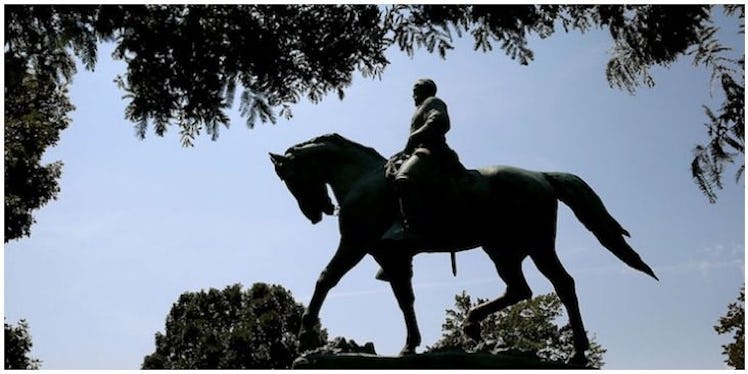
Charlottesville's Plan To Honor Heather Heyer With Shrouded Statues Is So Fitting
After a unanimous vote in city council on Tuesday, Aug. 22, Charlottesville will cover statues to honor victim Heather Heyer, shrouding statues of Confederate generals Robert E. Lee and Thomas "Stonewall" Jackson in black cloth, according to The Guardian. Heyer, 32, was one of hundreds protesting Unite the Right, a white supremacist rally protesting "white genocide" and the removal of the Lee statue in Charlottesville, Virginia on Aug. 12. In the midst of the fray, a car allegedly driven by one of the white supremacist ralliers rammed into a crowd of anti-racist counter-protesters -- including Heyer. More than a dozen people were injured, though Heyer was the only death.
Heyer's death, the horror of the rally itself, and President Donald Trump's tone-deaf remarks blaming "both sides" and the "alt-left" for the violence, have since sparked a nationwide fury. Cities and colleges around the country, including the city of Baltimore and the University of Texas-Austin, have removed Confederate monuments in the dead of night. Protesters in Durham, North Carolina toppled a statue on Aug. 14, and when one activist was arrested and charged with several felonies, hundreds turned up to the courthouse to turn themselves in.
But when it comes to Charlottesville's memorial to Heyer, why only shroud the statues instead of just removing them?
For now, Charlottesville's city council doesn't have the authority to remove Lee and Jackson's likenesses.
Charlottesville's city council had previously voted to remove the statues of Lee and Jackson, which led to an initial protest in May, led by "alt-right" troll Richard Spencer. Many who advocated that the statues remain cried foul, and claimed that removal would erase history. A judge stayed the removal in early May, and white supremacist figurehead Jason Kessler organized the large August protest against the statue's removal, Unite the Right, at which Heyer died.
The judge's injunction prevents the statues from being moved or sold for six months, according to NBC29, NBC's Charlottesville local affiliate. Judge Richard Moore said he issued the injunction to prevent irreparable damage from being done to the statues.
But these statues are more often than not cheaply made, Jim Crow- and Civil Rights-era symbols of intimidation for black Americans.
Charlottesville's Lee statue, for instance, was erected in 1924, well after the end of the Civil War. Many of these statues are part of the Daughters of the Confederacy's contribution to the loosely-organized "Lost Cause" campaign, which attempted to paint the Civil War as a fight for states' rights, not a fight over slavery.
In other words: these statues are physical symbols of white supremacy.
In the memorial service for Heyer on Aug. 16, Heyer's mother, Susan Bro, said that though she lost her daughter, she would continue to work for civil rights and social justice in Heyer's honor. She stated,
I think the reason that what happened to Heather has struck a chord, is because we know what she did is achievable. We don't all have to die ... They tried to kill my child to shut her up. Well, guess what? You just magnified her. You have to find in your heart that spark of accountability. I don't want you to turn away. You poke that finger at yourself and you make it happen. You take that extra step. You find a way to make a difference in the world.
So, while the ultimate fate of these statues is still up in the air, shrouding them in black is a start. And it's certainly befitting of the legacy of a woman who died protesting white supremacists, Ku Klux Klan members, and neo-Nazis, among others.